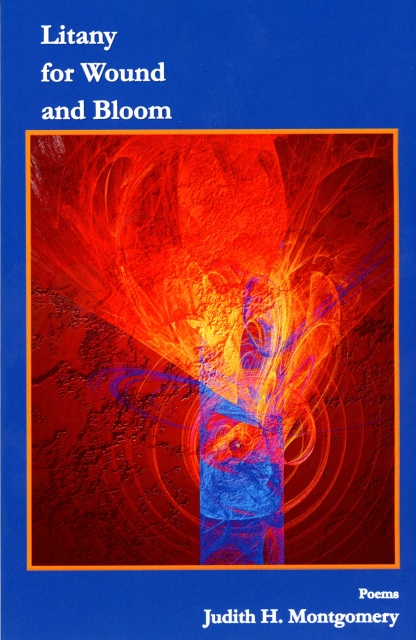
Uttered Chaos Press, 2018, 80 pages, $19
ISBN 978-0-9998334-1-4
As I often do when I start a book of poetry, I opened Judith Montgomery’s Litany for Wound and Bloom at random and dove in. The poems are startling and beautiful, standing on their own even without the arc of the arrangement, though that had its own pleasing form.
“Listen” drew me in first, repeating some lines like a refrain (if the moon had been tatter and fog… if I lived in green valleys of wheat), making the unfolding story even more appalling, like a lullaby turned horror story.
In the three evenly-divided sections – (Womb), (Word), (Witness) – which concern motherhood – all the joy and the pain, especially in our violent world, I found many deeply moving poems, some difficult to read because the pain is so vividly communicated.
While most of the poems are free verse, they are consciously shaped: often couplets, triplets or quatrains, with clearly much thought given to shaping lines in complement to the content.
A poet works to make form, word choice, and sound fly under the radar as we read, and yet it is a big part of what makes a poem memorable. Throughout the book, Montgomery creates musical arrangements (if the moon had been tatter and fog rather than if the moon had been tattered and foggy) in what seems an effortless, but very skilled, technique of creating rhythms and music in the reader’s mind. A mother’s tragedy seems more horrific for being described in this elegant way.
The first section (Womb) speaks of the longing for motherhood, the failure to achieve it, the success at last which carries its own fear and wounding. The poems helped me, a childless woman, to get a better sense of motherhood. I am sure it will resonate even more deeply with mothers. But more than that, these poems speak to how life wounds all of us, often in a place we’re most vulnerable:
each scar’s a scarlet witness on or
in the body, inscribing its stubborn
devotion: Hurt. Hurry. Heal.
(“Yet Praise the Scar”)
The details of menstruation, ovulation, conception are presented in lyrical terms:
…one packed golden drop releases, lit seed
slipping down the sleek chute until that fortunate
fall into the womb’s open heart…
(“Apoptosis”)
Poems like “Expectant: I,” detail a different kind of anticipation and contribute to the deep exploration of this timeframe in many women’s lives. In addition, Montgomery explores this timeframe’s parallel to writing, summed up with the last line in this section: “All words uncoil to bloom in the womb of the poem.” Say that line out loud and you will hear some of the musicality this book contains.
The second segment (Word) concerns many different women, individually and in groups. It is in this section that the title of the book seems most appropriate, because this is indeed a litany of wounding and also the blooming of women, real and mythological. For example, in “Black Seed,” the poet describes Persephone in haunting and multi-sensory triplets interspersed by strong single lines:
My right hand, reckless, sought a second
flamed bloom, its dab of deckled gold, its
bottomless black velvet cup. Dragon-
flies were gilding river air…
The poems describing the poet’s mother’s descent into Alzheimer’s employ symbol and detail to move the experience beyond the mundane. In “Sometimes,” she writes:
An indigo cloak clasped at her paper throat,
my mother is stepping
deep and deeper into a mute forest wing-lit with
birds, a basket of seeds
clutched in her hand. Once in a while, she
remembers…
The last section (Witness) contains both poems of a deeply personal nature and those that touch on wider themes like war from a mother’s point of view. The section moves from a poem about a family’s pet burial ground to a courthouse where a teen is given into state custody to the speaker examining an oil painting about WWI. It links feelings of love and fear that mothers can’t separate. In “Bearing/Bearing Down,” the speaker says:
to be turned inside-out,
laid open for the universe to witness bairn emerge
from a body that was barren …
and in “A Blessing”:
… Child who
tore from my body, who blooms
now most beautiful…
The narratives in this section are gripping. “But You My Son” had me speeding through the first time as if it were a thriller. I was holding my breath as the nurse raced to the son’s apartment to try and revive him, not knowing if this poem was addressed to a living or dead son.
she gears through stop and flashing lights
to thrust the fail-safe key
into your apartment
lock, she bursts into the tossing dark
where the great factory
of your breath…
I appreciated the end-notes Montgomery provides as they give some background, and confirm some of my guesses, and also the acknowledgments. The latter offers a glimpse into the community of poets within which she works.
All in all, this is a rich collection of poems celebrating and lamenting women’s lives, with intimate glimpses into some of the deepest pain women endure, and full of vivid wonder at the miracle of birth, of life.
BIO:
Catherine McGuire is a writer/artist with a deep interest in Nature, both human and otherwise. She’s had four decades of poetry in publications such as New Verse News, FutureCycle, Portland Lights, Fireweed, andon a bus for Poetry In Motion. She has four chapbooks out: Palimpsests (Uttered Chaos) and three self-published (www.cathymcguire.com). She also has a full-length book of poetry, Elegy for the 21st Century (FutureCycle Press) and a deindustrial science fiction novel Lifeline (Founders House Publishing). A new chapbook, An Inner Quicksand, will be published next year by Finishing Line Press, and more short stories and Lifeline’s sequel are due out from Founders House Publishing.
